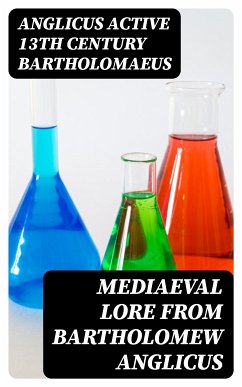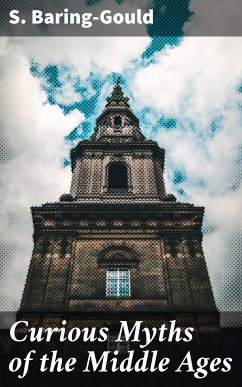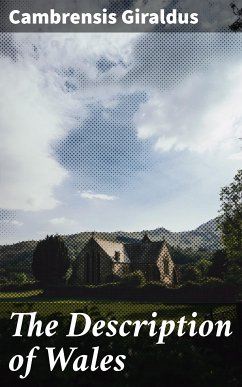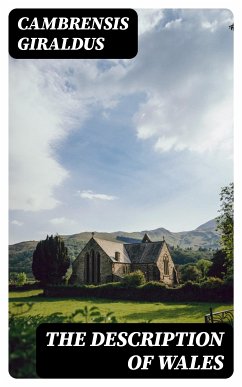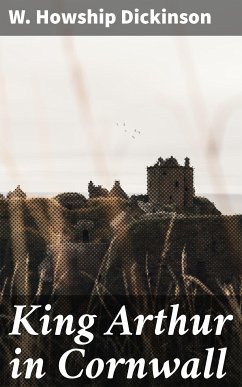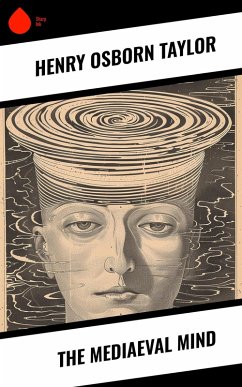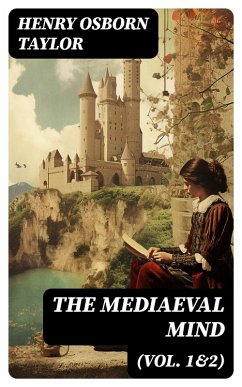
Mediaeval Lore from Bartholomew Anglicus (eBook, ePUB)
Enriched edition. Exploring the medieval worldview through Bartholomew Anglicus' lore
Kommentar: Rees, Blake / Redaktion: Good Press; Steele, Robert / Übersetzer: Trevisa, John
Sofort per Download lieferbar
1,99 €
inkl. MwSt.
Weitere Ausgaben:

PAYBACK Punkte
0 °P sammeln!
In "Mediaeval Lore from Bartholomew Anglicus," the 13th-century scholar Bartholomew of England compiles a remarkable anthology of medieval knowledge, weaving together threads from natural philosophy, psychology, and moral theology. His work epitomizes the medieval scholastic tradition, drawing from classical sources while reflecting the religious and intellectual currents of his time. Utilizing an accessible prose style, Bartholomew crafts a comprehensive guide to the phenomena of the natural world, enriching readers' understanding of botany, animal behavior, and astrology, all grounded within...
In "Mediaeval Lore from Bartholomew Anglicus," the 13th-century scholar Bartholomew of England compiles a remarkable anthology of medieval knowledge, weaving together threads from natural philosophy, psychology, and moral theology. His work epitomizes the medieval scholastic tradition, drawing from classical sources while reflecting the religious and intellectual currents of his time. Utilizing an accessible prose style, Bartholomew crafts a comprehensive guide to the phenomena of the natural world, enriching readers' understanding of botany, animal behavior, and astrology, all grounded within a theological framework. This compendium serves as a vital reflection of the medieval worldview, revealing how knowledge was intertwined with the spiritual and moral issues of the day. Bartholomew Anglicus, a cleric and author, was profoundly influenced by the intellectual revival occurring in 13th-century Europe, which emphasized the integration of philosophy and theology. His extensive travels and study forged his critical eye and a desire to connect complex ideas in a manner that would educate and illuminate the minds of his contemporaries. In a landscape where knowledge was often segregated, Bartholomew's work bridges multiple disciplines, highlighting a holistic approach to learning that was rare for his time. "Mediaeval Lore from Bartholomew Anglicus" is an essential read for anyone intrigued by the evolution of thought during the Middle Ages. This book not only provides valuable insights into medieval knowledge systems but also serves as an excellent resource for scholars, historians, and avid readers who seek to understand the contextual significance of medieval lore in shaping contemporary intellectual culture. In this enriched edition, we have carefully created added value for your reading experience: - A succinct Introduction situates the work's timeless appeal and themes. - The Synopsis outlines the central plot, highlighting key developments without spoiling critical twists. - A detailed Historical Context immerses you in the era's events and influences that shaped the writing. - A thorough Analysis dissects symbols, motifs, and character arcs to unearth underlying meanings. - Reflection questions prompt you to engage personally with the work's messages, connecting them to modern life. - Hand-picked Memorable Quotes shine a spotlight on moments of literary brilliance. - Interactive footnotes clarify unusual references, historical allusions, and archaic phrases for an effortless, more informed read.
Dieser Download kann aus rechtlichen Gründen nur mit Rechnungsadresse in A, B, BG, CY, CZ, D, DK, EW, FIN, F, GR, H, IRL, I, LT, L, LR, M, NL, PL, P, R, S, SLO, SK ausgeliefert werden.




